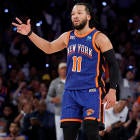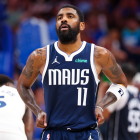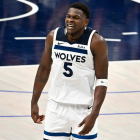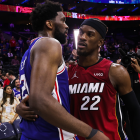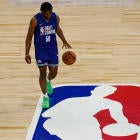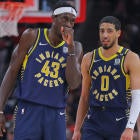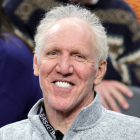Last summer, Dan Buettner went to Sicily. International travel, for him, is not out of the ordinary. Since 2002, Buettner has been going around the world, studying its healthiest and happiest people for National Geographic. His bio on the magazine's website describes him as an author and adventurer, a researcher and explorer. He was not on the Mediterranean island, however, to collect data or report a story. He was there to share what he has learned with the ultra-rich and ultra-famous invited to Google Camp, the secretive retreat at the luxurious Verdura Resort.
Among the reported guests: David Geffen, Harry Styles and Diane von Furstenberg. Buettner delivered the kickoff speech.
"You're not supposed to talk about it," Buettner told me, "but since it's in the Wall Street Journal, it's already out there."
On Tuesday, the Wall Street Journal published its cover story about Kevin Durant, written by J.R. Moehringer, and it indeed mentions Google Camp. After reading the story, Buettner, who is not much of a sports fan, remembered meeting Durant there.
"He actually came up to me and started asking me about different facets of happiness," Buettner said.
They talked for about 15 minutes, and Durant impressed Buettner with his intellectual curiosity. The future Hall of Famer came off as "enormously thoughtful and reflective, almost quiet," he said. Eventually, Buettner asked Durant what brought him there.
"Well, I'm a basketball player," Durant replied.
At the end of the conversation, Buettner's girlfriend asked him if he knew who he'd been talking to. He did not. He just knew, he said, that Durant "was very interested in the topic."
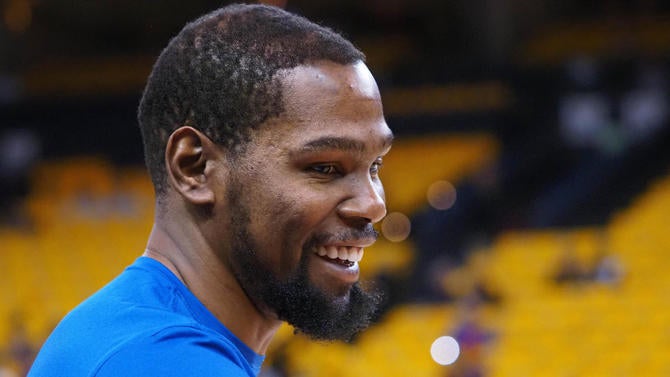
At his introductory press conference after signing with the Golden State Warriors in 2016, Durant said that he chose to go to the Bay Area because he has "a short amount of time left to play basketball" and he wants "to enjoy every single day of it." He understood his decision to leave Oklahoma City would upset people, but he felt Golden State was the best place for him. Between his burner-account blunder in 2017 and the free-agency speculation that hung over the 2018-19 season, his level of happiness has since then turned into a national discussion.
"People are always like, Are you happy? It's like, Yo, what the f--- does that mean right now?" Durant told the WSJ. "That was the whole thing this year: Is K.D. happy where he is?"
Durant has a reputation as someone who, as Steve Nash put it on a recent podcast with The Ringer's Bill Simmons, "is continually pushing himself and searching for whatever it is out there that is going to fulfill him or excite him." The less charitable version of that, in Moehringer's words: Nothing's good enough for this guy. Ironically, some of the same people who thought he was insufficiently happy in a seemingly perfect situation had roasted him for choosing it. Durant acknowledged to the WSJ that he has "always been on a search," but he rejects the notion that he is some kind of mope. Introverts everywhere surely relate.
Perhaps an intense interest in your state of mind comes with the territory when your professional decisions affect multi-billion dollar organizations. There is something dehumanizing, though, about this discourse. Durant isn't rhetorically asking what the f--- happiness means because loads of people genuinely care about his well-being; he is asking because loads of people want to know about his well-being, but only insofar as it determines where he plays basketball. Besides, on the fuzzy definition of the term, he has a point.
"He's right on about happiness," Buettner said. "Academically speaking, happiness is a meaningless word because you can't measure happiness."
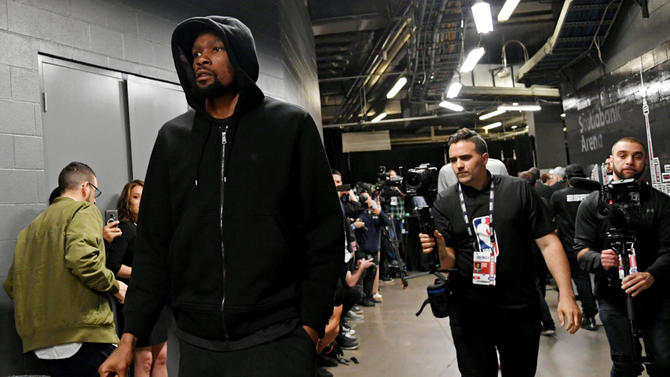
What you can measure, according to Buettner, are two loosely correlated concepts: Life satisfaction and positive or negative affect. The former is how you evaluate your life, the latter how you experience it day-to-day. Buetter bets that, in his quiet moments, Durant would rate very high on the Cantril Self-Anchoring Scale, which assesses life satisfaction, because of his wildly successful career. The day-to-day stuff is more complicated, but Buettner thinks Durant is on the right track.
In 2017, Buettner published a National Geographic cover story and a book called "The Blue Zones of Happiness" about the happiest places on Earth. The central thesis is that, if you try to change your behavior to be happier, you will fail. The vast majority of diets and exercises plans do not stick.
"It's a recipe for neurosis," Buettner said. "If you want to be happier, change your environment."
Durant signed with the Warriors "wanting to be part of a group, wanting to be a part of a family, and definitely felt accepted," he told the WSJ, but over time realized that "I'm just different from the rest of the guys. It's not a bad thing. Just my circumstances coming up in the league." He also called Kyrie Irving, his new Brooklyn Nets teammate, his "best friend in the league." Another friend, DeAndre Jordan, joined the Nets in free agency, and two others -- Caris LeVert and Taurean Prince -- were already on the roster. Durant must have instinctively recognized that going to Brooklyn would allow him to "live out what he stands for and with the people with whom he resonates," Buettner said.
If Buettner were Durant's life coach, he would recommend spending no more than an hour on social media per day or hiring somebody to manage his accounts. He would also advise him to "curate a portfolio of friends," four or five people who really love him for who he is. Durant might be ahead of the game on that one.
"The most dependable way to be happy on a day-to-day basis is to surround yourself with people who care about you and you actually like," Buettner said.














